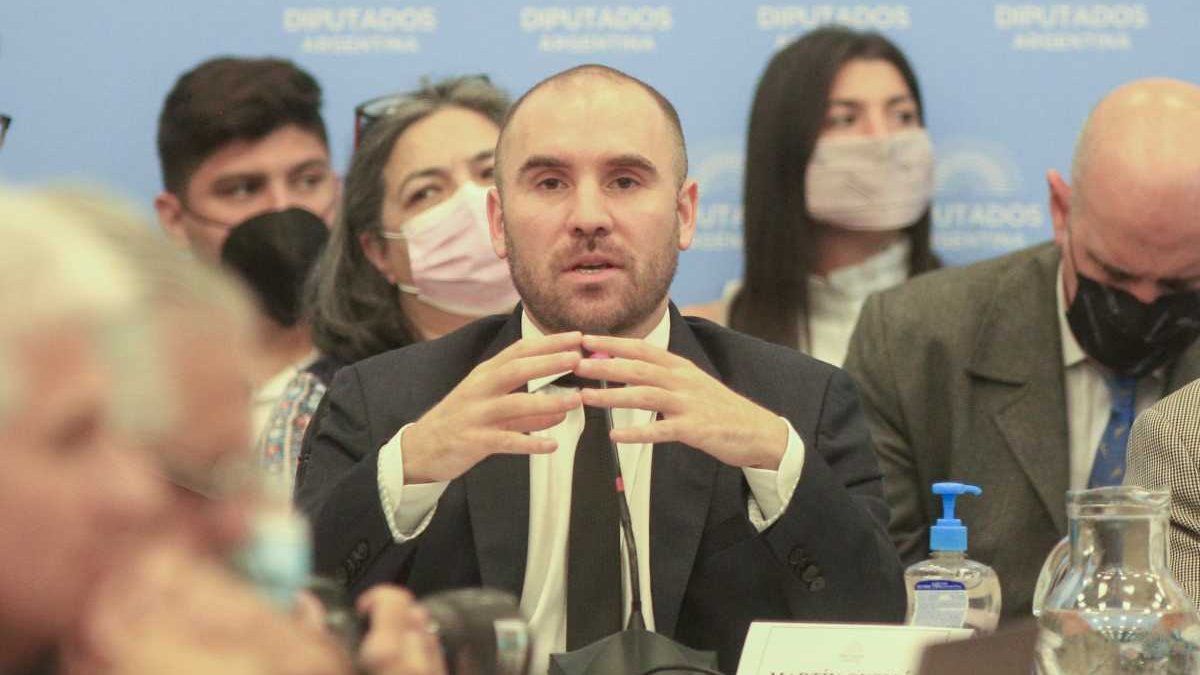Alain Touraine in his book “After the crisis” spoke of the insufficiency of representative democracies, weakened in societies. Already then Touraine expressed that they were moving away from the governmental sphere with great social impact. […Quisimos que la democracia fuera representativa y estuvo bien que así fuera; sin embargo, actualmente es necesario identificar los intereses que son representables y asegurar que los dirigentes sean efectivamente representativos, más que de los intereses particulares o de su propio interés, del interés general…]
One of lime and one of sand for the Minister
If the extreme austerity of 2001 and 2018 in Argentina was not the economic response, the recovery of the Argentine economy since the 2001 default and the two pandemics did not occur as a consequence of these public policies either; but, precisely, because they were alleviated or interrupted. Says Stiglitz Martin.
It is conceivable that if each one of the elements of those stories was wrong, neither before the crisis did it fall into fiscal waste, nor was the deficit an unmanageable problem. It was the crisis, a phenomenon generated by public policies such as the privatization of pensions that caused a huge drop in public income in favor of the creation of the AFJP. It is the collapse of economic activity that always causes austerity, and not discretionary spending policies, which drives imbalances in public accounts (Stiglitz)
The pension expense
Regarding the privatization of the retirement system, it should be added that it generated little coverage, poor social security in retirement, and minimum values of pensions on average. In a short time, as a result of the lack of financing, all of society paid this enormous cost. The one that won, or certainly benefited, was the financial sector, which increased its income in Argentina, while causing an enormous loss for society.
The hypnotic litany
The narrative of the dictatorship, of extravagant public spending that suffocates private activity, was installed and internalized as a certainty in the citizenry and weakened the opposition policies of the traditional progressive parties even in the 1990s. Up to the point, that in the 1999 elections, there was the agreement of a continuity-to continue with the Convertibility-promised by the Alliance, it was the FREPASO that chose not to face the neoliberal story, it is not known if because it was partially shared with or from the UCR or because they were convinced that it was a political battle that they could not win.
It is that the neoliberal technocrats inserted a fiction in the political sphere that was decisive in conditioning their political positions, through conscience manufacturing consensus, to the point of manipulating Congress to delegate extraordinary powers to an economy minister.[1]. That ability of the technocrats-of De la Rúa’s cast-to establish fears, an urgent need to establish the austerity of social spending as something necessary for life in a democracy, was a decisive instrument in the architecture of common places from which they constructed the stories that articulated the ideological and cultural hegemony of power.
Let us not begin to compare López Murphy, Sturzenegger and Cavallo with Martin Guzmán, because “The monster has not died” by Horacio Meyrialle with Narciso Ibáñez Menta may return in 2023. And the naive will see the difference.
The weight that they have recovered until today, the failures of 2019 and the new post-fascist versions, the synchronized swimming that homogenizes the political discourse that systematically denatures and distorts political and economic facts is intensified by “the overflow of what the boss calls” internal debate.
The Argentine experience would seem to show that institutions are not enough when political representation is delegitimized. Be careful not to pull too much on the rope because if Alberto catches a cold, Cristina-the transparent Republicans who respect the institutions-will not even allow her to take office, as the Constitution provides.
Let’s remember 2000-2001 and “La Banelco”
The resignation of Vice President “Chacho Álvarez”, leader of a faction of the ruling coalition in October 2000, the resignation of various ministers in protest at the fiscal adjustment announcements by the new economy minister López Murphy in March 2001, and the fall of the Alliance government in December of that year, has to open the eyes of the obsessive compulsive.
The transfer of political power to the technocracy and/or finance (BCRA independent of political power, “Cavallo superminister of economy” with supreme powers voted by the National Congress), had a decisive impact on the future of the Argentine crisis of 2001. Fundamentally for following to the letter the totality -not a part- of the “recommendations” established by the multilateral credit organizations and the “best practices” of the market; understanding that the legitimate political leaders (the Executive Power first, and the Legislative Power later, with the enactment of the Law called “special powers”), as mentioned, delegated political decisions to officials of the Ministry of Economy, and to their Once the latter, they accepted all the conditionalities of the IMF[2]including assignments from the same organization, such as investment banking, international and local consulting firms.
-Is someone really warning that Alberto Fernandez and Congress are doing the same with Martin Guzmán? -Does anyone see that level of autonomy that Néstor Kirchner cut short and not even Macri gave Prat Gay? –
We could add an epiphenomenon that supports the idea that the Argentine officials of the economy ministry – who in March 2001 received “full powers” from Congress – did not do enough to preserve local interests, a 15% Mega-swap in dollars , renouncing the sovereign rights to establish their own public policies, which included economic, social and international aspects. Rather it could be that their decisions have coincided with the external and internal impositions of the international ideological and political biosphere. -Is that what Fernandez and Guzmán are doing?’ Or -Could it rather be the path of the eventual heirs of a defeat of the ruling party in 2023?-
How does the system work?
Being a country that does not abide by IMF recommendations has a series of implications that affect all spheres of rights guarantees. In principle, the fact of being stripped of the international credit of all the other international organizations (WB, IDB, Paris Club, etc.) which no politically organized country can totally do without. In the same way, it implies the irruption of intellectual possession, constituted by neoliberal networks, with a vision of the world and of life very far from other systems of interpretation of reality (Stiglitz).
The final result or the emerging situation after default 2001 and restructuring of the debt, ended with the country in a condition of “contempt” of Argentina, a dispute with the “holdouts” (bondholders who did not accept the restructuring of the external debt), but more specifically with a minority called “voulture funds” (vulture funds). The economic cost of the negotiation with the vultures was immeasurable, it cannot be repeated. If Prat Gay and Caputo come back (metaphorically), “they solve it in 5 minutes”.
In conclusion, Chacho Álvarez produced an institutional crisis that would bring about unthinkable consequences, including for himself. This should introduce a perspective. -What was Álvarez thinking? -The beginning of the end corresponded to that decision, and the subsequent accelerated displacement of public policies in the neoliberal context.
From the Álvarez episode, to the resignation of President Fernando De la Rúa, the implementation of extreme fiscal and monetary orthodoxy measures, the changes of 3 economy ministers and the resignation of 5 cabinet ministers, revealed the magnitude and speed that can take events, as if to take into account “the dynamics of folly”
Congress granted extraordinary powers to Cavallo. Minister Guzmán did not even have the budget approved. The Congress allowed Cavallo to implement the main aspects of regulations, laws and public policies related to the granting of greater powers to the Minister of Economy and his team, it included the perspective of the displacement of power, already formally raised from the policy at the level of the Legislative Power, represented by the scenario limited to the orders emanating from the multilateral credit organizations.
It was in this scenario that the local government structure emphasized speeding up local regulations, in order to respond to the demands of the institutions that would eventually provide support. Later, in 2018, Macri would do the same, with greater impunity, eluding all institutional controls – they underestimated him – while the opposition – today the impolite wing of the ruling party – watched Caputo squander all the dollars until Lagarde herself fired him. The latter happened, and requires a pending review. Nobody did anything to stop them. – What were the deputies of the opposition thinking – today ruling party -? – Why was there not a march or a hug to the BCRA? –
The obfuscation of the dissatisfied could accelerate the return of Macri to do “the same but faster”
A quarter before the social outbreak of 2001, it was happening among the orthodox, the same thing that is happening today among the heterodox. There was a debate in the ruling party about the policies to be implemented, from different orthodox points of view-those of strictly monetary orientation, and those of fiscal and monetary matters-. While they argued, the irremediable collapse that these conflicts produce took place.
In conclusion
It is about reconstructing and identifying the errors of an officialism that led to a crisis of magnitude. At this point we could ask ourselves two questions: -What did the former vice president “Chacho Álvarez” achieve politically, where is Frepaso today?- and, -To what extent did his reaction (October 6, 2000) have an impact and lead to Plaza de Mayo massacre of December 20, 2001?
[1] Professor of Postgraduate UBA and Masters in private universities. Master in International Economic Policy, Doctor in Political Science, author of 6 books. @PabloTigani Carlos Gervasoni, Political crisis and financial crisis in the Government of the alliance
[2] in Argentina (1999-2001) Argentine Catholic University / Torcuato Di Tella University / CEMA University. Visiting Resource Professor at LLILAS/UT-Austin. October, 2002, Table 5, Page 26
http://www.imf.org/external/np/exr/facts/spa/pdf/conditios.pdf
Source: Ambito




